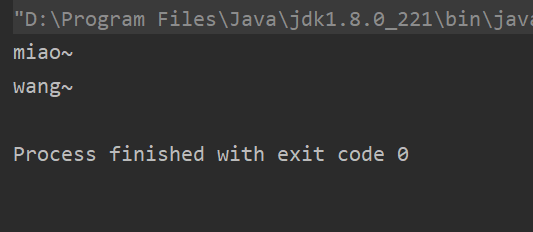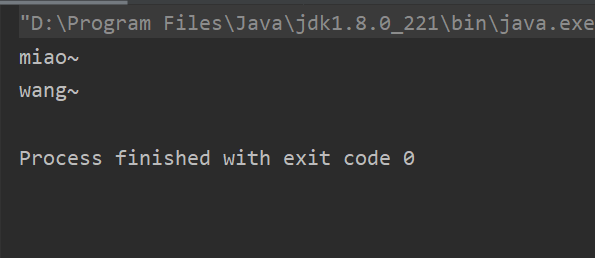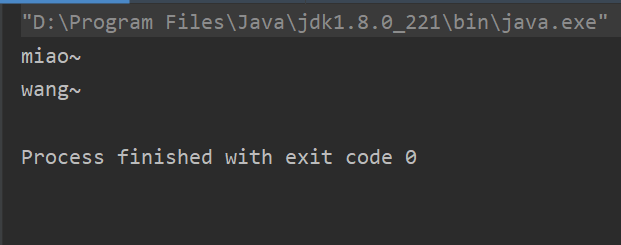Automatic assembly of beans can simplify our code. Here is an example. First, create three entity classes
package com.zhiying.pojo;
public class Cat {
public void shout() {
System.out.println("miao~");
}
}
package com.zhiying.pojo;
public class Dog {
public void shout() {
System.out.println("wang~");
}
}
package com.zhiying.pojo;
public class People {
private String name;
private Dog dog;
private Cat cat;
public String getName() {
return name;
}
public void setName(String name) {
this.name = name;
}
public Dog getDog() {
return dog;
}
public void setDog(Dog dog) {
this.dog = dog;
}
public Cat getCat() {
return cat;
}
public void setCat(Cat cat) {
this.cat = cat;
}
@Override
public String toString() {
return "People{" +
"name='" + name + '\'' +
", dog=" + dog +
", cat=" + cat +
'}';
}
}
Then the configuration file, the core
<?xml version="1.0" encoding="UTF-8"?>
<beans xmlns="http://www.springframework.org/schema/beans"
xmlns:xsi="http://www.w3.org/2001/XMLSchema-instance"
xsi:schemaLocation="http://www.springframework.org/schema/beans
https://www.springframework.org/schema/beans/spring-beans.xsd">
<bean id="dog" class="com.zhiying.pojo.Dog"/>
<bean id="cat" class="com.zhiying.pojo.Cat"/>
<!-- This is the normal way to inject-->
<!-- <bean id="people" class="com.zhiying.pojo.People">-->
<!-- <property name="name" value="He Zhi Ying"/>-->
<!-- <property name="cat" ref="cat"/>-->
<!-- <property name="dog" ref="dog"/>-->
<!-- </bean>-->
<!--
//Automatic assembly with autowire
byName: Will automatically find in the container context, and their own objects set The value after the method corresponds to the beanid
byType: It will automatically search in the container context, which is the same as its own property type bean
-->
<!-- use autowire Automatic assembly,Use byName-->
<!-- <bean id="people" class="com.zhiying.pojo.People" autowire="byName">-->
<!-- <property name="name" value="He Zhi Ying"/>-->
<!-- </bean>-->
<!-- use autowire Automatic assembly,Use byType-->
<bean id="people" class="com.zhiying.pojo.People" autowire="byType">
<property name="name" value="He Zhi Ying"/>
</bean>
</beans>Finally, the test
import com.zhiying.pojo.People;
import org.springframework.context.ApplicationContext;
import org.springframework.context.support.ClassPathXmlApplicationContext;
public class MyTest {
public static void main(String[] args) {
ApplicationContext context = new ClassPathXmlApplicationContext("applicationContext.xml");
People people = (People) context.getBean("people");
people.getCat().shout();
people.getDog().shout();
}
}

Conclusion:
When byName is used, you need to ensure that all bean IDs are unique, and that the bean must be consistent with the value of the set method of the auto injected property
When byType is used, the class of all beans should be unique, and the bean should be consistent with the type of the automatically injected property
Annotation for automatic assembly
@Autowired annotation
The same first is entity class
package com.zhiying.pojo;
public class Cat {
public void shout() {
System.out.println("miao~");
}
}
package com.zhiying.pojo;
public class Dog {
public void shout() {
System.out.println("wang~");
}
}
package com.zhiying.pojo;
import org.springframework.beans.factory.annotation.Autowired;
public class People {
private String name;
@Autowired
private Dog dog;
@Autowired
private Cat cat;
public String getName() {
return name;
}
public void setName(String name) {
this.name = name;
}
public Dog getDog() {
return dog;
}
public void setDog(Dog dog) {
this.dog = dog;
}
public Cat getCat() {
return cat;
}
public void setCat(Cat cat) {
this.cat = cat;
}
@Override
public String toString() {
return "People{" +
"name='" + name + '\'' +
", dog=" + dog +
", cat=" + cat +
'}';
}
}
Then the configuration file needs to be annotated
<?xml version="1.0" encoding="UTF-8"?>
<beans xmlns="http://www.springframework.org/schema/beans"
xmlns:xsi="http://www.w3.org/2001/XMLSchema-instance"
xmlns:context="http://www.springframework.org/schema/context"
xsi:schemaLocation="http://www.springframework.org/schema/beans
https://www.springframework.org/schema/beans/spring-beans.xsd
http://www.springframework.org/schema/context
https://www.springframework.org/schema/context/spring-context.xsd">
<!-- Open notes-->
<context:annotation-config/>
<bean id="cat" class="com.zhiying.pojo.Cat"/>
<bean id="dog" class="com.zhiying.pojo.Dog"/>
<bean id="people" class="com.zhiying.pojo.People"/>
</beans>And then there's the test
import com.zhiying.pojo.People;
import org.springframework.context.ApplicationContext;
import org.springframework.context.support.ClassPathXmlApplicationContext;
public class MyTest {
public static void main(String[] args) {
ApplicationContext context = new ClassPathXmlApplicationContext("applicationContext.xml");
People people = (People) context.getBean("people");
people.getCat().shout();
people.getDog().shout();
}
}

@Resource comments
This annotation is provided by Java, but the configuration file cannot be few. Only the javax package is imported into the People class. Here, only the People class is modified, and others remain unchanged
package com.zhiying.pojo;
import javax.annotation.Resource;
public class People {
private String name;
@Resource
private Dog dog;
@Resource
private Cat cat;
public String getName() {
return name;
}
public void setName(String name) {
this.name = name;
}
public Dog getDog() {
return dog;
}
public void setDog(Dog dog) {
this.dog = dog;
}
public Cat getCat() {
return cat;
}
public void setCat(Cat cat) {
this.cat = cat;
}
@Override
public String toString() {
return "People{" +
"name='" + name + '\'' +
", dog=" + dog +
", cat=" + cat +
'}';
}
}

Conclusion:
@The difference between Autowired and @ Resource:
@Autowired is implemented by byType, and the object must exist
@Resource is implemented by byName. If the name cannot be found, it is implemented by byType, and no error can be found

